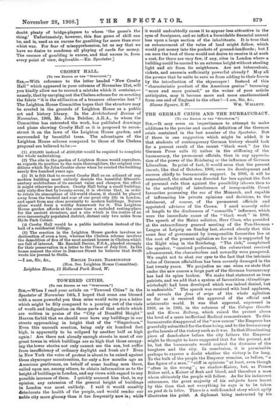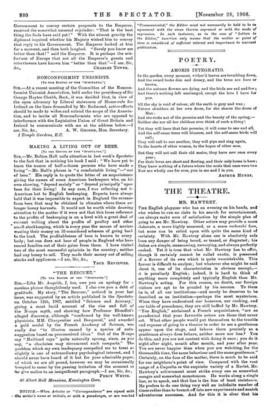THE GERMAN CRISIS AND THE BUREAUCRACY.
[Ti) THE EDITOR OF THE " SPECTATOZ.1 SIE,-It may seem an impertinence to attempt to make additions to the precise and careful definition of the German crisis contained in the last number of the Spectator. But if there is one suggestion which might be added, it is that students of contemporary German history should look for a present result of the recent " black week " (as the German Press calls it) rather in the stiffening of the bureaucracy, the permanent officials, than in any apprecia- tion of the power of the Reichstag or the influence of German Liberalism. In point of fact, it would seem that the present inieute, like that of October, 1906, owes its development and success chiefly to bureaucratic support. In 1906, it will be remembered, the attack was directed far less against the fact of personal rule than against the possibility (shown then to be the actuality) of interference of irresponsible Court favourites possessing the ear of the Monarch, and capable of influencing his private opinions and decisions, to the detriment, of course, of the permanent officials and appointed advisers of the Crown. I need scarcely refer at length to the disclosures of " camarilla " influence, which were the immediate cause of the " black week " in 1906. The speech of the Mainz solicitor, Herr Class, who presided at the extraordinary general meeting of the Pan-German • League at Leipzig on Sunday last, showed clearly that this same fear of government by irresponsible favourites lies at the root of the present agitation so far as it is supported by the Right wing in the Reichstag. " The rich," complained the speaker, " received preferment, the subservient received advancement, the characterless and cowardly were pampered. We ought not to shut our eyes to the fact that the intrinsic value of German officialdom has been severely damaged in the last twenty years. We prejudice no one when we state that under the new course a large part of the German bureaucracy has had its spine broken. We make that statement as true patriots, and we add that a system of favouritism (Giinstlings- wirtschaft) had been developed which was indeed denied, but is undeniable." The speech was received with loud applause, and reveals the fons et origo of the whole agitation so far as it received the approval of the official and aristocratic world. It was that approval, expressed in 1908, as in 1906, in the columns of the Cologne Gazette and the Kreuz Zeitung, which raised the protest above the level of a mere ineffectual Radical remonstrance. To this bureaucratic disapproval of the "new course" the Emperor has gracefully submitted for the time being, and to the bureaucracy go the laurels of the victory such as it was. In that illuminating piece of dumb-show before the city fathers the Emperor might be thought to have suggested that for the present, not he, but the bureaucrats would control the destinies of the burghers and the city. In conclusion, it is permissible perhaps to express a doubt whether the victory is for long. To the bulk of the people the Emperor remains, as before, " a fine figure of a man," "stiff in opinions " at least, even though "often in the wrong " ; no shadow-Kaiser, but, as Prince Billow said, a Kaiser of flesh and blood, and therefore a man whom ultimately the people will follow. As for his indiscreet utterances, the great majority of his subjects have learnt by this time that not everything he says is to be taken au pied de la lettre. There is a well-founded story which aptly illustrates the point. A diplomat being instructed by his-
Government to convey certain proposals to the Emperor, received the somewhat unusual rejoinder: "That is the best thing the fools have said yet !" • With the utmost gravity the diplomat inquired whether his Majesty wished him to convey that reply to his Government. The Emperor looked at him for a moment, and then both laughed. "Surely you know me better than that!" said the Emperor. It is perhaps the mis- fortune of Europe that not all the Emperor's guests and interviewers have known him "better than that,"—I am, Sir,
CHARLES TOWER.



















































 Previous page
Previous page